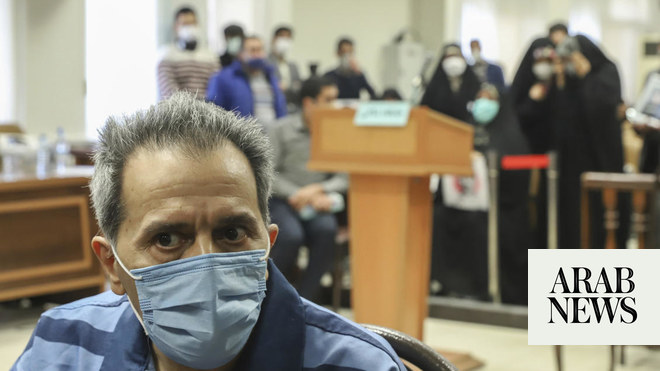
Tehran court sentenced to death an Iranian-German dual national accused of being the leader of a “terrorist” group behind a deadly 2008 mosque bombing
The group Sharmahd is accused of leading aims to topple the Islamic republic and is outlawed as a terrorist organization by Iran
BERLIN: Germany has declared two employees of the Iranian embassy personae non gratae and ordered them to leave the country in protest over Iran sentencing a German national to death, a statement from the foreign office said on Wednesday.
Germany also summoned Iran’s charge d’affaires over the issue, Foreign Minister Annalena Baerbock said in a statement, adding: “He was informed that we do not accept the massive violation of the rights of a German citizen.”
“We call on Iran to revoke Jamshid Sharmahd’s death sentence and provide him with a fair appeal process based on the rule of law,” she added.
A Tehran court on Tuesday sentenced to death an Iranian-German dual national accused of being the leader of a “terrorist” group behind a deadly 2008 mosque bombing, the judiciary said.
“The Tehran Revolutionary Court sentenced Jamshid Sharmahd, the leader of the Tondar terrorist group, to death on the charge of corruption on earth through planning and directing terrorist acts,” the judiciary’s Mizan Online news agency reported.
Mizan said Sharmahd could appeal against his death sentence before the supreme court.
“The trial of this case was held in seven sessions in the presence of the accused and his lawyer, the plaintiffs and their families,” it said.
“According to the documents of the case, Sharmahd planned to commit 23 terrorist acts, of which he succeeded in five including the bombing of a mosque in (the southern city of) Shiraz on April 12, 2008, which killed 14 people and wounded 300 others.”
Iran-born Sharmahd, 67, who is also a German national and a US resident, was arrested in August 2020.
The group he is accused of leading aims to topple the Islamic republic and is outlawed as a terrorist organization by Iran.
Tondar, which means “thunder” in Farsi, is also known as the Kingdom Assembly of Iran.
Iran has criticized its arch-enemy Washington for having welcomed Sharmahd, accusing it “of supporting known terrorists who have claimed responsibility for several terrorist acts” in Iran.
Sharmahd, whose dual nationality is not recognized under Iranian law, grew up in an Iranian-German family, and moved to California in 2003, where he reportedly made statements hostile to both Islam and the Islamic republic on Farsi-language television channels based outside Iran.
Iran has carried out several executions in recent months that have sparked international outcry. In mid-January, it executed Iranian-British dual national Alireza Akbari, a former Iranian official, after convicting him of spying.










